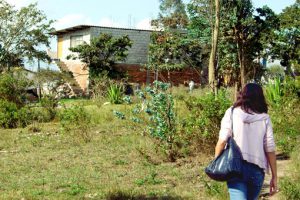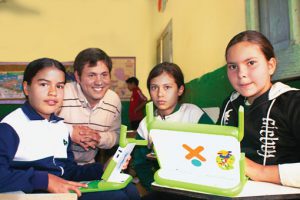
Global Poverty Amid Global Plenty: Getting Globalization Right
The proximate cause of poverty is low productivity. Poor people are poor because their labor produces too little to adequately feed and house them, let alone provide adequately for other needs such as health care and education. Low productivity, in turn, has diverse and multiple causes. It may be the result of lack of credit, … Read more

Social Exclusion and Political Change
Overcoming widespread poverty and inequality is not just a moral imperative. It is key to political and economic development. Social exclusion acts as a drag on sound and sustainable economic growth by preventing large segments of the population from fully contributing to the formal economy. And even if formal political rights exist on paper, social … Read more

The Dream Deferred
*Watch an AQ Q&A interview with Marcelo Suárez-Orozco. The U.S.-born children of immigrants, and newcomers who arrive at an early age, have deep roots in their communities. Regardless of whether their parents “have papers” or not, these children and youth attend U.S. schools, learn English and develop an emerging American identity. But for children from … Read more
East Meets South
*Interview with the director of the Confucian Institute in Mexico City. *Interview with a teacher at the Confucian Institute. Mexico’s Chinese population and links between the two cultures continue to grow as new business and trade opportunities bring the two countries together. In this photo essay, AQ explores the multiple dimensions of their growing ties … Read more

[i]El país de uno: Reflexiones para entender y cambiar a México[/i] by Denise Dresser
Despite boasting the second largest economy in Latin America, a noteworthy record of fiscal and economic management in the midst of global turmoil, and envious commercial ties to the United States, Mexico has failed to take its rightful place as a global powerhouse. Many observers wonder why Mexico has not achieved its true potential. What, … Read more
[i]O novo Brasil: as conquistas políticas, econômicas, sociais e nas relações internacionais[/i] by Albert Fishlow
Few would disagree with the notion that Albert Fishlow is the right person to write the book on Brazil’s transformation over the past 30 years. He has followed the country since the early 1960s and contributed personally to its economic policy debates—both in Brazil and in the United States. He helped train a legendary cohort … Read more

[i]The Southern Tiger: Chile’s Fight for a Democratic and Prosperous Future[/i] by Ricardo Lagos
Ricardo Lagos has been a central figure in creating the Chile we know today—a prosperous democracy and a model for much of the region. Whether as an academic, an activist in the struggle for democracy, a minister of education (1990–1992) and of public works (1994–1998), a president (2000–2006), or once again, a major figure in … Read more
Trade: Brazil’s New Protectionist Agenda
Brazilian policymakers seem to be making import substitution industrialization (ISI) fashionable again. The dominant economic model between 1950 and 1970 in Brazil and much of the region is often credited with the development of Brazil’s industrial sector—that is, until it fell victim to inefficiencies and to isolation from the more dynamic global market. Those same … Read more
Education: Chile’s Students Demand Reform
Chile’s educational success over the past two decades would seem to be a model for the region. Ironically, it was precisely those advances—and the problems they created—that led Chilean students into the streets in May last year to call for an overhaul of the country’s higher education system. Chile´s high school graduation rates have increased … Read more
Finance: The Importance of Foreign Exchange Reserves
An important lesson of the 2008–2009 financial crisis was that the emerging market economies with high levels of international reserves were better able to withstand the ripple effects of the global meltdown. In Latin America, the cases of Brazil and Mexico provide a clear illustration. When Lehman Brothers went under in September 2008, Brazil had … Read more

Dispatches: Ecuador’s Invisible Refugee Population
Quito, Ecuador. Javier González* was teaching his nine-year-old son Miguel how to play chess on the living room floor when Miguel’s mother, Rosa, interrupted their game. “Tell us what happened at school today,” she said. Miguel looked at the floor and recounted what his Ecuadorian classmate had said to another student during gym class: “Don’t … Read more

Politics Innovator: Sebastián Acha, Paraguay
More than two-thirds of Paraguayans are under the age of 30. For National Deputy Sebastián Acha, that’s both an opportunity and a challenge. He believes his country’s technologically aware and young population, combined with a growing economy, can turn Paraguay into a regional model for agricultural development, educational innovation and political transparency. In fact, the … Read more

Civics Innovator: Pivot Legal, Canada (slideshow available)
See below for photos of Vancouver’s Downtown Eastside community from the Pivot Legal/Hope in Shadows annual photography contest. Pivot Legal Society is not your ordinary public interest law firm. The Vancouver-based nonprofit organization with a staff of seven focuses on a single troubled neighborhood—the Downtown Eastside (DTES), an impoverished and marginalized community of 15,000. Employing … Read more

Business Innovator: Buscalibros, Chile
When they want to buy or sell an obscure book, most U.S. consumers go to major online retailers like Amazon or eBay, which offer millions of book titles and a graphic interface that makes browsing and buying quick and easy. But for bibliophiles in Latin America, finding books in Spanish—especially ones published in the region—is … Read more

Arts Innovator: Edmar Castañeda, United States
*Read a transcript of AQ‘s interview with Edmar Castañeda below. Edmar Castañeda can boast not just one, but two accomplishments that most musicians only dream of. The 33-year-old Colombian harpist has introduced international audiences to a distinctly South American musical style—joropo—and he has broken new ground in jazz. Castañeda is first and foremost a performer … Read more


